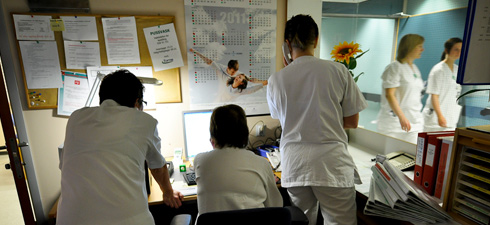More and more Lithuanians are working abroad, but only leaving home for short periods. Four weeks in Norway, and two in Lithuania: this is the package that Norwegian homecare providers typically offer prospective medical personnel.
In Lithuania, the emigration of doctors and nurses has become a headache for everyone. It seems as if they are all leaving the country one after the other. This year, close to 3% of our doctors opted to try their luck abroad — a phenomenon that has in part been prompted by the opening of the German labour market.
According to official figures, non-specialist nurses working in Lithuania earn a net average of 1,074 litas [311 euros] per month, and the low pay is one of the main reasons why they are opting to go abroad.
A shortfall of doctors
Employers in Scandinavian countries, which offer a high level of medical services, and where there is a shortfall of doctors, are taking advantage of the situation. The Finns are recruiting in Estonia, while the Norwegians are active in Lithuania. However, no one is being asked to emigrate, just to come and work on short-term missions.
Nurses who sign with Norwegian companies work four weeks in Norway before returning home for two weeks off. The amount they are paid depends on their level of seniority in Norway: with salaries varying from 7,000 (€2,000) to 14,000 (€4,000) litas per month.
Jurgita Papiliauskiene has been working in Norway since 2009. Now a homecare nurse in Bergen, a year ago she left a job in which she looked after patients in a hospital not far from Kristiansund. Looking back on her career in Lithuania, she remarks that it had its good and bad points. “I have no complaints about my former employers: the head doctor was an ideal colleague and a team player. I always did lots of of overtime, but my salary, even with all of the work, was never more than 2,000 litas (€580).”
Waiting for change in Lithuania
To avoid losing her nurse’s license, she continued to work one day in four at the hospital while holding down a better paid post as a personal assistant in a service-station management company. But her new job was soon hit by the onset of the financial crisis in 2008, which saw her salary melt away. It was while she was looking for yet another job that she found a company offering positions in Norway. She says, “It was the huge drop in my pay that forced me to take the decision.”
Sandra, age 39, has been putting in the hours in Norway since June: “I had been working in Lithuania for 20 years, but then I had to deal with the restructuring of the hospitals, the job cuts and reduced salaries. I had to find a solution,” she says. “In Norway, immigrants are given the least qualified posts, even when they have high-level qualifications. However, my employer did make the effort to explain how the Norwegian health system works, and even organised some language classes for me.” In Lithuania, Sandra was paid just 1,000 litas net (290 euros) per month. In Norway, her hourly rate is still only 33 litas (10 euros), but it is much more than she used to earn.
For Vyturys Svedas, a urologist in the town of Orkanger, “the more Lithuanian doctors leave, and the more they are in a hurry to do so, the sooner there will be change in Lithuania. It is not a lot to ask: doctors should be able to make a decent living, and not have to depend on under-the-table commissions.”
Context
A (very) slow exit from recession
The unprecedented austerity – spending cuts, tax increases, and wage cuts – decided by the government at the end of 2008 looks to be achieving results, notes IQ The Economist: “From the point of view of ordinary citizens, the situation today appears a lot less dangerous than it was three years ago. Those in the private sector, who were the worst affected, are now seeing their salaries once again begin to rise, or at least to stabilise.” Nonetheless the situation remains tense, remarks the monthly: 10.3% of the working population is unemployed and emigration has never been higher.
Was this article useful? If so we are delighted!
It is freely available because we believe that the right to free and independent information is essential for democracy. But this right is not guaranteed forever, and independence comes at a cost. We need your support in order to continue publishing independent, multilingual news for all Europeans.
Discover our subscription offers and their exclusive benefits and become a member of our community now!












